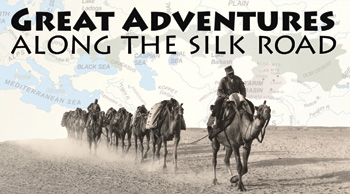Lectures

Great Adventures along the Silk Road
First Wednesday of every month from October 2010 to June 2011
From mummies to Marco Polo to military warfare to the Black Death... Explore the many adventures the Silk Road has to offer in this monthly lecture series on the first Wednesday of every month at 6:00pm from October to June.
October 6, 2010
Great Sites on the Silk Road
by Dr. Nancy S. Steinhardt
Dr. Nancy Steinhardt, Professor of East Asian Art and the Museum's Curator of Chinese Art, will introduce the Silk Road in relation to the exhibition Secrets of the Silk Road opening February 5, showing some routes, early travelers, major sites, key monuments, and some most extraordinary discoveries.
November 3, 2010
Mummies of the Tarim Basin
by Dr. Victor H. Mair
Dr Victor H. Mair, Curatorial Consultant for "Secrets of the Silk Road," and co-author, The Tarim Mummies, discusses the ongoing discovery of these extraordinary mummies, what we have learned-and what remains to be uncovered.
December 1, 2010
From Macedon to Ai Khanum: Alexander the Great and Early Greek Contact with the Silk Route
by Dr. Jeremy McInerney
January 5, 2011
From Baghdad to Bukhara and Back
by Dr. Renata Holod
February 2, 2011
The Plague: Deadly Travel Companion of Trade Routes
by Dr. Lester Little
Lester K. Little, Professor of History, Smith College, focuses on plague in this "Great Adventures" lecture. Virtually all of the major epidemics of infectious diseases in history have followed quite closely upon recently opened avenues of communication. This is clearly the case with the most dreaded of diseases, bubonic plague, in all three of its documented pandemics. The first of these united East and North Africa, the Middle East, and Europe, the second all of Eurasia, and the third seaports throughout the world. What role did the Silk Road play in this grim history?
March 2, 2011
Samarkand in the Age of Tamerlane (Timur Lang)
by Dr. Renata Holod
Old Samarkand- Afrasiyab was completely destroyed by the Mongol invasion of 1220. The centuries-old site stood abandoned. The new Timurid Samarkand arose in the surrounding gardens to become a model for early modern cities of western Asia. Reception to follow.
April 6, 2011
Afghanistan
by Dr. Fredrik Hiebert
May 4, 2011
Looking East from Constantinople: Byzantium and the Silk Road
by Dr. Robert G. Ousterhout
June 1, 2011
From Venice to Xanadu: Marco Polo's Silk Road Adventure
by Dr. Paul M. Cobb
Special Series Rates
Subscription rate (for all 9 lectures): $40
Regular Individual Lecture Rates
Penn Museum members with Advanced Registration: FREE
General Admission with Advanced Registration: $5
General Admission/Members At the Door: $10
Free for Full-time college students with ID
Contact
(215) 898-2680














